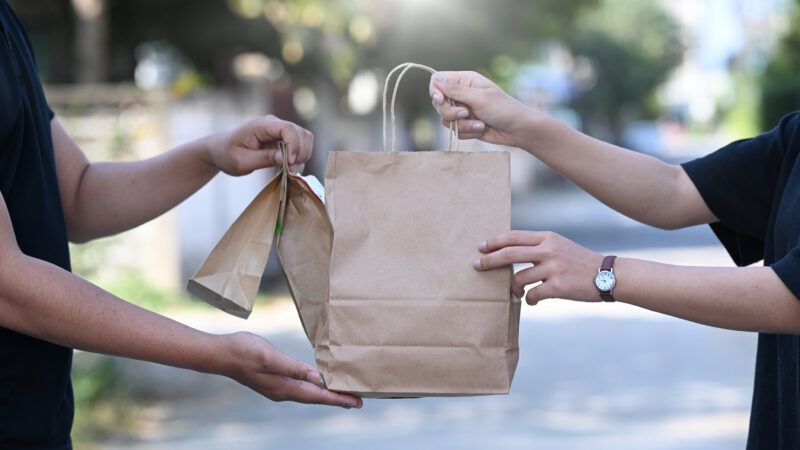Seattle Law Mandating Higher Delivery Driver Pay Is a Disaster
Just two weeks after the law went into effect, Seattleites had to contend with $26 coffees and $32 sandwiches.

In 2022, Seattle's City Council passed an ordinance mandating a minimum earnings floor for app-based food delivery drivers in the city. The law finally went into effect in January 2024, but so far the main result has been customers deleting their delivery apps en masse, food orders plummeting, and driver pay cratering.
The ordinance, part of a legislative package called "PayUp," was passed under the banner of protecting gig workers. By setting a compensation floor for app-based delivery drivers based on miles driven and amount of time worked, the ordinance operates as a (supremely complicated) minimum wage.
The wage floor is based on labyrinthine calculations: the "engaged minutes" for drivers are multiplied by a "minimum wage equivalent rate," which is then multiplied again by an "associated cost factor" and then multiplied yet again by an "associated time factor." Next, this sum is added to the total of "engaged miles" of drivers, multiplied by the "standard mileage rate" and then multiplied once more by the "associated mileage factor." (If you're lost, don't worry—the text of the ordinance itself literally does the math for you).
Heralded as a "first-of-its-kind" legislative breakthrough when it passed, the first two months of the ordinance's operation have provided a grim real-world Economics 101 lesson. First, the delivery companies were forced to add a $5 fee onto delivery orders in the city to cover the sudden labor cost increase. On cue, news stories started popping up of $26 coffees, $32 sandwiches, and $35 Wingstop orders in which taxes and the new fee comprised nearly 30 percent of the total.
Local news station King 5 reported that Seattle residents started deleting their delivery apps from their phones in response to the spiking exorbitant delivery prices. Uber Eats experienced a 30-percent decline in order volume in the city, while DoorDash reported 30,000 fewer orders within just the first two weeks of the ordinance taking effect.
In turn, this decrease in demand directly impacted the pocketbooks of the delivery drivers themselves. A driver who made $931 in a week this time last year saw his earnings drop by half to $464.81 in a comparative week this year. Another reported consistently making $20 an hour prior to the ordinance, only to see his earnings likewise fall by more than half since its enactment.
In other words, while the ordinance theoretically raises driver earnings to over $26 per hour—a number that ironically far exceeds Seattle's $19.97 standard minimum wage—drivers are barely logging any hours as a result of the drastic decrease in demand for food delivery. As one Seattle driver summarized: "It was dead. Demand was dead." A second driver put it more bluntly: "I've got nothin'. I'm not gonna sit here for hours for one frickin' order."
In addition to drivers, those who have been hardest hit include local mom and pop restaurants that have seen delivery orders dry up, and even the city's elderly and disabled population who often depend on affordable delivery options for meals. One might imagine that progressive politicians would be quick to repeal a law that hurts workers, noncorporate local businesses, and the elderly and disabled all at the same time, but Seattle's government officials are busy either doubling down or dissembling.
A spokesman for the mayor noted that "should the data show there have been unintended impacts for workers and small businesses, we are always open to making improvements"—a criterion which has clearly been met already—but nonetheless clarified that the mayor still "stands strongly in support" of the minimum wage ordinance.
Meanwhile, the president of the City Council claims she is "very worried" about the ordinance's impacts so far—and even argues that "it's not the role of policymakers to regulate the profit margins of companies"—before going on to say "I'm not going to redo the whole legislation."
The near future looks even grimmer for Seattle delivery customers and drivers. After passing the PayUp package, the City Council then decided that implementing the minimum earnings portion of the ordinance would require five new full-time government employees in the city's Office of Labor Standards (expanding to nine employees by 2027) and $1.2 million per year (escalating to $1.56 million annually by 2027). To fund these additional costs—as well as other parts of the PayUp package—the Council voted this past November to tack on a 10-cent per-delivery fee, which will take effect in 2025 and is projected to generate $2.1 million in annual revenue for the city coffers.
While the desire to protect delivery drivers may be based on good intentions, the solutions pushed by progressive politicians too often hurt more than help. If policy makers really want to support app-based gig workers, they should instead enact rules protecting independent contracting status while also experimenting with portable benefit models that actually could help these workers.
But given the recalcitrance of city officials, Seattle residents likely will have to resign themselves to more $26 coffees for the foreseeable future.


Show Comments (235)